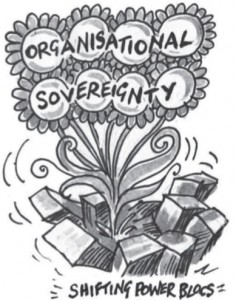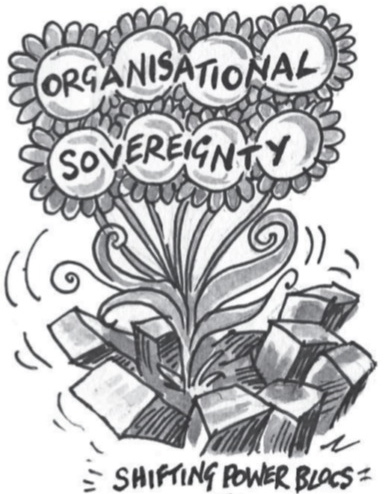Taken from: The Barefoot Collective. (2009). The Barefoot Guide to Working with Organizations and Social Change. Cape Town: Community Development Resource Association. Retrieved March 18, 2009, from www.barefootguide.org
Some of the larger international NGOs working out of a rights-based approach have begun to recognise the importance of supporting local organisations and social movements to be sovereign. But despite the speak of “rights” we continue to witness local organisations or “partners” being assessed, even self-assessed, against templates, checklists and models of institutional “best practices” developed in the North and having their capacity built accordingly.
We witness lively volunteer-based organisations and emerging grassroots movements being rebuilt into more professional organisations that lose their character and represent only the interests of the community that align with funding or NGO guidelines. We witness them developing into better-behaved “partners,” possibly alleviating some small vestiges of poverty in the short-term, but angry only when the funding slows or stops. The anger then no longer is directed at the injustices the organisations were born out of. As a result, they can become a pale shadow of their potential at best and a blockage to authentic development at worst.
Key aspects of sovereign organizations
What are some of the key aspects of the identity of a sovereign organisation or movement?
- A sovereign organisation strives to know and work with its own purpose. It works on and out of clear principles and values and has the courage to hold onto these.
- It is an authentic expression of the will and voice of its own constituents. It can provide services but is not the service provider of another organisation’s purpose. While it may accept funding, it is not a surrogate vehicle for the funded projects of outside agencies.

- A sovereign organisation is culturally and structurally unique, not a clone of some external “best practice” template.
- A sovereign organisation is politically conscious, knows its rights, and responsibilities and understands the power relationships it is held in.
- A sovereign organisation is able to cooperate and collaborate with co-travellers and peers without losing its sense of self. Sovereignty does not denote parochial, insular behaviour.
- Sovereignty is both a quality and a process of continual learning. The ability to learn and adapt will determine an organization’s sovereignty in a changing and volatile world and thus its increasing effectiveness. A sovereign organisation learns from many and varied sources, primarily its own hard-earned experience, but also through its diverse horizontal learning relationships with co-travellers and peers.
- A sovereign organisation is unlikely to meet the criteria of most donors.
But sovereignty is not easy
We witness vibrant, if disorganised, community-based organisations, movements and local NGOs, continuing to line up for funding from international donors. This means fitting themselves, their work, structure, language, indeed their life, into the templates of short-term funded projects and tightly contained project-cycles. Thus, local organisations continue to be the service-providers of donors and government to achieve externally-formulated project goals, with a few token participative processes thrown in to give them local flavour. Most are assisted by NGOs and professional consultants, themselves competing for funding and held to account against external measures. And as such, sovereignty is a hard thing to achieve.
 It is in encouraging and supporting the qualities and processes of organizational development that we find the real challenges of developmental practice for NGOs and donors. What it requires is the time and patience to see what is living in local sovereign organizations that is authentic and has potential. The work of development practitioners must be rooted in a deep respect for what is indigenous and a subtlety of practice to give thoughtful and careful support to local organizations where it is needed.
It is in encouraging and supporting the qualities and processes of organizational development that we find the real challenges of developmental practice for NGOs and donors. What it requires is the time and patience to see what is living in local sovereign organizations that is authentic and has potential. The work of development practitioners must be rooted in a deep respect for what is indigenous and a subtlety of practice to give thoughtful and careful support to local organizations where it is needed.
It also requires NGOs, governments, and donors, beholden to their own values that are derived from serving the needs and rights of the people and organisations they seek to support, work on their own sovereignty.
Read Part 1


i will like to know how to register my organization as a sovereign organization
This is a concept/idea that is hard to achieve. It is not a formal recognition process, but rather something to which organizations can aspire.